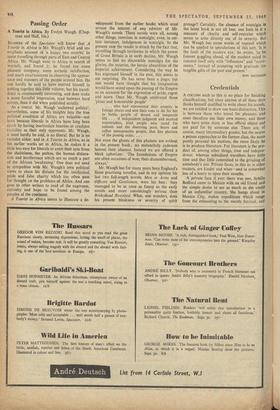Passing Order
A Tourist in Africa. By Evelyn Waugh. (Chap- man and Hall, 16s.) READERS of the Spectator will know that A Tourist in Africa is Mr. Waugh's brief and un- emphatic account of 'a happy two months' he spent travelling through parts of East and Central Africa. Mr. Waugh went to Africa in search of warmth, and found it; he found too some pleasant company, some aesthetic satisfaction, and much en,L:rtaininent in observing the appear- ance and manners of the people around him. He can hardly be said to have exerted himself in putting together this little volume; but his travel- diary is continuously interesting, and does make a more forceful impression, read between hard covers, than it did when published serially.
As a tourist. Mr. Waugh 'eschewed politics'; nevertheless, some of his insights into the true political condition of Africa are valuable—not least because liberals in Africa have long been spoilt by having inarticulate hearties or crackpot racialists as their only opponents. Mr. Waugh, it need hardly be said, is no liberal. But he is no racialist either, and in A Tourist in Africa, as in his earlier works set in Africa, he makes it a little less easy for liberals to avert their eyes from the shabbiness, the pathos, the human disloca- tion and incoherence which are so much a part of the African 'awakening.' One does not need to sympathise with Mr. Waugh's own political views to share his distaste for the intellectual pride and false charity which too often pass for thought on the problems of Africa. And one goes to other writers to read of the eagerness, curiosity and hope to be found among the peoples of the continent.
A Tourist in Africa seems to illustrate a de-
velopment from the earlier books which must arouse the interest of any admirer of Mr. Waugh's novels These novels were all, among other things, exercises in nostalgia; even, in cer- tain instances, indulgences in nostalgia. In the present case the reader is struck by the fact that, travelling through territories in which the power of Great Britain is in swift decline, Mr. Waugh seems to feel no discernible nostalgia for the glories, the miseries, the heroic absurdities of the imperial achievement. Considering the way he has expressed himself in the past, this seems to me surprising He has never been a jingo; but one would have thought that his imagination would have seized upon the passing of the Empire as an occasion for the expression of pride, regret and scorn. Once Mr. Waugh celebrated those 'pious and honourable people' . . . who had represented their country in foreign places and sent their sons to die for her in battle, people of decent and temperate life . . . -'f independent judgment and marked eccentricities, kind people who cared for animals and the deserving poor, brave and rather unreasonable people, that fine phalanx of the passing order. . . .
Not even the ghosts of this phalanx are evident in the present book : no melancholy cadences lament their absence. Instead we are offered a bleak aphorism: 'The foundations of Empire are often occasions of woe; their dismemberment, always.'
Mr. Waugh has for many years been England's finest practising novelist, and in my opinion his last two full-length novels, Men at Arms and Officers and Gentlemen, were his best: they managed to be at once as funny as the early novels and more convincingly serious than Brideshead Revisited. What, one wonders, does his present bleakness or severity of spirit presage? Certainly, the absence of nostalgia in the latest book is not all loss; one feels in it a measure of charity and self-restraint which seems to arise directly out of its severity. But Mr. Waugh has some words of reproof which can be applied to speculations of this sort. 'It is the fault of the modern eye,' he writes, 'to be forever goggling ahead, of the modern mind to concern itself only with "influences" and "move- ments," instead of accepting with gratitude the tangible gifts of the past and present.'
DAN JACOBSON














































 Previous page
Previous page